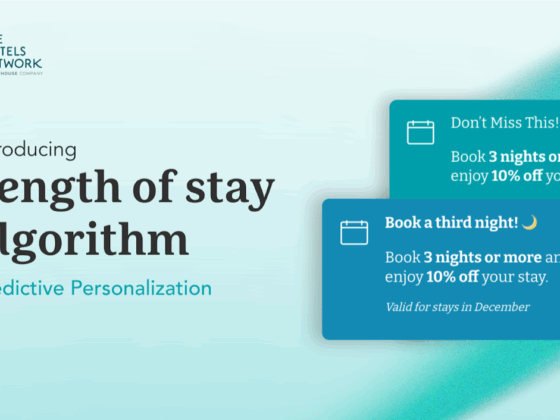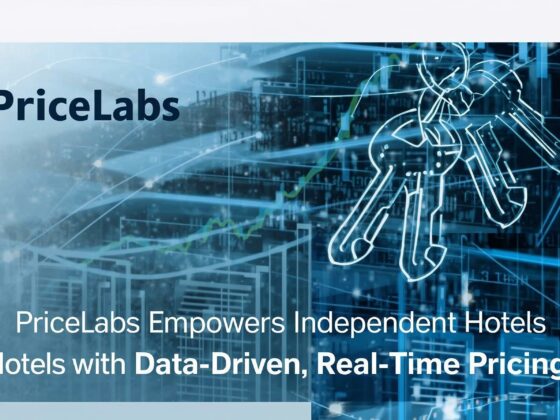The most significant barrier holding back hotel F&B isn’t cost, but comfort, a deep-seated comfort with outdated systems. It’s the notepad by the pool, the clunky POS terminal, and the data that never leaves the restaurant. This operational friction is a constant source of frustration for staff and a silent disappointment for guests who expect more.
This was a central theme of our conversation with F&B technology expert Chris Lawson, Head of Partnerships and Solutions at IPORT. His insights reveal a clear path forward for hotel F&B technology, one focused not on replacing staff but on finally giving them the smart, connected tools they need to deliver truly exceptional service.
Takeaways
Embrace a phased approach: Modernize your technology in incremental steps. Use small, mobile-first wins to build momentum.
Augment your staff, don’t replace them: Deploy technology to handle repetitive tasks. This frees your team to focus on building meaningful connections with guests.
Infrastructure is the foundation: A mobile strategy needs reliable hardware support. Prioritize secure device charging and protection.
Integration is non-negotiable: Connect your F&B tech with core hotel systems. A unified data flow enables true personalization.
Turn raw data into action: Leverage insights from all your F&B data. Use it to drive strategy, from menus to staffing.
The challenge of legacy operations
What outdated operational aspects or guest interactions in the food and beverage landscape of hospitality need significant disruption?
Many F&B operations still rely on fragmented, manual processes. This is especially true from handwritten poolside orders to limited integration between the POS and guest profiles. These friction points significantly slow down service. Moreover, they severely limit any real opportunity for personalization. For example, a server taking an order on a notepad must then walk to a fixed terminal. This introduces delays and potential for error. The guest, in turn, experiences slower service.
Furthermore, this lack of integration creates a disjointed experience. A guest’s preferences, allergies, or previous orders are not readily available. Consequently, every interaction starts from zero. There’s a clear and urgent opportunity here. We must reimagine these interactions through mobile, data-driven tools. These tools must align with modern guest expectations for speed and recognition. They also need to support the operational realities of a busy, dynamic hotel environment. The disruption needed is one that connects systems and empowers staff with information.
Table-side ordering devices have been emerging for a while, but the miss has been that those devices are still purpose built technology, lacking future-proof technology, while still requiring the frontline to use other tools at the same time to get their job done. There is no more powerful tool than an iOS device. Why give them a brick order entry device that can only do one thing and has built-in obsolescence? Chris Lawson
Transitioning from outdated technology is a significant challenge for hotel food and beverage (F&B) operations. What strategic barriers, aside from cost, hinder the adoption of modern tech solutions, and how can leadership address these issues?
One of the biggest barriers is psychological, not financial. Long-standing systems create a false sense of stability. This happens even when they’re fundamentally misaligned with today’s guest expectations. The fear of complexity or disruption often fuels this strategic inertia. Teams are accustomed to their workflows. Therefore, the prospect of a massive overhaul can be paralyzing. Leadership often hesitates, worried about the impact on daily operations.
Overcoming this requires a new perspective. Leadership must prioritize flexibility and cross-functional alignment. They need to view modernization as a phased journey, not a binary switch. You don’t have to change everything at once. Adopting intuitive, mobile-first tools can be a powerful first step. Specifically, those built on familiar platforms like iOS reduce training time. When supported by enterprise-grade accessories like IPORT’s docking and charging systems, they help ease this transition. This approach reduces the perceived operational risk. It also delivers quick wins that build momentum for further change.
The new service dynamic
How can innovative technology enhance the guest experience in hotel F&B beyond ordering and payments, creating more personalized, memorable, and seamless moments that enrich their stay?
Technology is most impactful when it enables staff to deliver intuitive, anticipatory service. It’s about moving beyond the transaction to create a moment of genuine connection. Imagine, for example, a server who can greet a returning guest by name. With a quick glance at an iPad, they can recall that guest’s dining preferences. They could then suggest a personalized wine pairing. These are small but incredibly meaningful touches. They create a powerful sense of recognition that transcends a standard service interaction.
This is where the true elevation occurs. The guest feels seen and valued as an individual. The technology works silently in the background. It provides the staff member with the right information at the right time. Consequently, the interaction feels personal and effortless. It’s this kind of thoughtful, tech-enabled service that elevates the dining experience from a simple meal to a core memory of their stay. This, in turn, fosters a deeper connection to the hotel brand.


“One of the biggest barriers is psychological, not financial. Long-standing systems create a false sense of stability, even when they’re misaligned with today’s guest expectations.” Chris Lawson
Augmenting Staff, Not Replacing Them
Balancing automation with human connection is vital. Where is the human touch irreplaceable, and how can technology enhance staff without sacrificing genuine hospitality?
Human warmth, empathy, and spontaneous interaction remain irreplaceable. This is particularly true in high-touch venues, such as fine dining restaurants, bars, and lounges. You cannot automate a genuine smile or an empathetic response to a guest’s needs. These human elements are the very essence of hospitality. They are what create a welcoming and comfortable atmosphere. Therefore, the goal of technology should never be to replace these core human strengths.
However, technology can and should remove much of the repetitive cognitive load. Tasks like managing orders, splitting checks, running to the kitchen, or checking on stock levels are distractions. They pull staff away from the guest. By automating or simplifying these processes, technology frees up the employee. It allows them to be more present and engaged in the moment. In this way, technology ultimately enhances, not diminishes, the hospitality experience by giving your team more time and mental space to focus on what matters most: the guest.
The narrative that technology will replace hospitality staff is common. How can this be countered in F&B? Provide examples of how technology enhances human roles, allowing staff to focus more on guest interactions.
That narrative misunderstands the fundamental role of well-deployed technology. In our experience, mobile-enabled teams are consistently more engaged and effective. The technology becomes a partner, not a replacement. When staff no longer need to leave the guest’s side to enter orders or process payments at a fixed station, their entire workflow changes for the better. They can deliver faster, more accurate, and more attentive service because they are always present.
This powerful shift reallocates their effort. It moves their focus from transactional tasks to relational moments. For instance, instead of spending time walking back and forth to a terminal, a server can now use that time to discuss the menu, anticipate a drink refill, or simply build rapport with the diners. The technology handles the logistics. The human handles the hospitality. The result is a more efficient operation and a significantly improved guest experience, driven by staff who feel more empowered and less burdened by monotonous tasks.
The power of an integrated ecosystem
What tangible, high-impact AI use cases do you see delivering real value today in hotel F&B operations, while maintaining service intuition?
AI is already making a tangible impact in several key areas. This includes demand forecasting, menu optimization, and personalized recommendations. The key is that these applications are practical and purposeful. For instance, AI can analyze historical sales data, weather patterns, and local hotel occupancy. It can then identify patterns in ordering behavior to help chefs adjust prep levels. This directly reduces food waste and controls costs.
On the guest-facing side, it can prompt upsell or cross-sell suggestions that feel natural, not scripted. An AI-powered POS might suggest a specific dessert wine that pairs well with a chosen dessert, based on successful pairings from thousands of previous orders. The key is subtlety. The AI should provide a gentle nudge or a piece of data that enhances the server’s own service intuition, not replace it. It’s an intelligent assistant, helping staff make smarter decisions in the moment.
How important is the integration of F&B technology (POS, inventory, ordering) with core hotel systems (PMS, CRM) for a unified guest experience and efficient operations? What are the common pitfalls?
Seamless integration is not just important; it is essential for both back-of-house efficiency and the guest experience. Without it, you operate with blind spots. Guest preferences recorded at the restaurant go unshared with the front desk. Opportunities for personalization are lost at every turn. A unified data ecosystem allows for a 360-degree view of the guest, which is the foundation of modern hospitality.
One of the most common pitfalls is investing in impressive, purpose-built F&B solutions without a clear integration roadmap. A hotel might buy the best new POS on the market. However, if it cannot communicate with the existing PMS, they have created a new, more sophisticated silo instead of removing an old one. The goal must be a holistic technology stack where data flows freely between systems. This ensures that guest intelligence is shared and leveraged across the entire property, creating a truly cohesive and personalized journey.
While most hotels collect a significant volume of data, very few operationalize it effectively. Data is often siloed within the F&B department itself. It is used for basic reporting but not for broader strategic planning. There’s a vast, largely untapped opportunity to link POS insights, guest feedback from surveys, and purchasing data from inventory systems. This connected data can drive profound improvements.
For example, by analyzing what sells best on a rainy Tuesday versus a sunny Saturday, you can optimize menus and staffing. By linking ingredient costs to menu item popularity, you can engineer a more profitable menu. The biggest untapped potential lies in making F&B data actionable across departments. This information shouldn’t be confined to the restaurant manager’s office. It should inform marketing, procurement, and overall hotel strategy. It’s about transforming raw data into business intelligence.
Future-proofing F&B innovation
What areas of hotel F&B tech innovation are often overlooked but could significantly improve operational efficiency or the guest experience?
Infrastructure is often the unsung hero of innovation. Many properties invest heavily in sophisticated, guest-facing software. However, they frequently overlook the foundational role of mobile hardware in enabling modern service. You can have the best app in the world, but it’s useless on a device that is broken, uncharged, or inaccessible. This is where tools that support the hardware become critical.
Solutions must provide the essential infrastructure that allows staff to securely dock, charge, and carry iPads between service areas. This ensures devices are kept powered, protected, and always ready for the next guest interaction. This kind of mobility unlocks faster workflows and better consistency. It also provides greater flexibility, which is especially vital in high-volume or nontraditional service environments where fixed terminals can’t keep up. Overlooking this foundational layer is a common mistake that undermines larger technology investments.
What technological shift or trend do you predict will most impact hotel F&B operations and guest interactions in the next 3-5 years?
Hyper-personalization, driven by real-time data and embedded AI, will fundamentally reshape the F&B experience. This is the most critical shift on the horizon. Guests will increasingly expect every interaction to reflect their known preferences. This includes everything from personalized wine pairings to dietary needs that are remembered across different properties within the same brand. The expectation for this level of personal service will become standard.
As AI capabilities become more native to platforms like Apple’s iOS, hotel teams will be able to deliver these personalized moments faster and more intuitively. They will do so directly from the mobile devices they already use. The properties that succeed will be those that not only unify guest data across their systems but also equip their teams with the mobile tools that turn that insight into immediate action right at the point of service.
Connecting technology to reputation
What is the biggest misconception hotel operators and F&B managers have about adopting new technology, and what advice would you give for successful implementation and ROI?
A common misconception is that modernizing your tech stack requires a massive, painful, and disruptive overhaul. In reality, today’s flexible, mobile-first platforms, especially those built on mature ecosystems like Apple’s, can be rolled out incrementally with minimal friction. You do not have to rip and replace everything overnight. You can start in one area, such as poolside service, prove the concept, and expand from there.
My advice is always to start with clear and specific objectives. What problem are you trying to solve? From there, choose scalable partners and solutions that can grow with you. Most importantly, focus on use cases that deliver quick, demonstrable wins for both your staff and your guests. When your team sees that a new tool makes their job easier and guests react positively, you create a virtuous cycle of adoption and enthusiasm.
How can a hotel’s F&B technology strategy enhance its brand reputation, foster guest loyalty, and generate positive online reviews, elevating F&B from a mere functional amenity?
Today’s guests don’t just remember the meal, they remember how the entire experience made them feel. A seamless F&B journey that is fast, personalized, and consistent powerfully reinforces a property’s brand promise. It leaves a lasting positive impression. Technology plays a quiet but critical role in making this happen. When teams are equipped with mobile POS on iPads, securely mounted, always charged, and instantly accessible, their focus shifts. They can concentrate more on the guest and less on the transaction.
This elevation of service leads to stronger emotional connections with your guests. Those connections are the bedrock of loyalty. They are what motivate someone to write a glowing online review, to recommend your hotel to a friend, or to book their next stay. The result is not just a better dining experience; it’s better reviews, higher loyalty scores, and more repeat visits. It transforms F&B from a cost center into a powerful driver of brand reputation.
Final words
The path to a modern F&B operation is not paved with technology alone. As the conversation with Chris reveals, it is a strategic journey that places the human experience at its core. It requires a shift in mindset, from seeing technology as a complex disruption to viewing it as an essential enabler of excellent service. The future of hotel F&B is one where integrated systems and intelligent data empower staff, and where seamless mobile workflows allow for genuine, personal connections to flourish. By focusing on augmenting people, integrating systems, and investing in a robust mobile infrastructure, hotels can unlock the full potential of their F&B offerings, turning them into a defining element of their brand and a powerful engine for guest loyalty.








